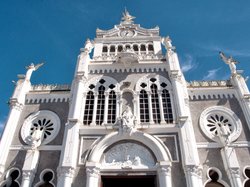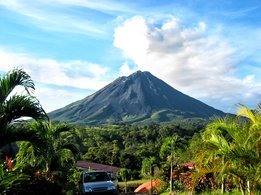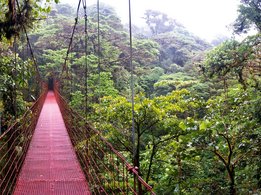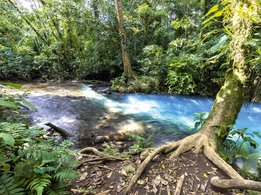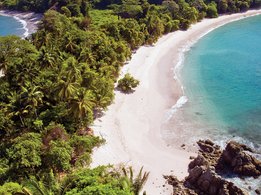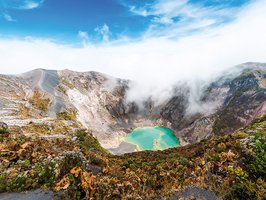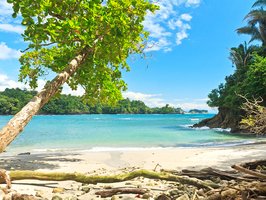Costa Rica Travel Information
Entry & Exit
- United States of America
- Canada
- Australia
- Brazil
- Japan
- Panama
- Singapore
- Uruguay
Tourists over the age of 18 are allowed to carry up to 3 litres of alcohol, 500 grams of tobacco, 400 cigarettes or 50 cigars, and a reasonable quantity of perfume for personal use.
Firearms and ammunition are to be declared at the airport and stored in a safety case that's in accordance with airport safety regulations. These will be handed over to airport staff during check-in, and will be returned to the traveller upon arrival. All weapons are to be reviewed by airport police and must be accompanied with a valid license.
You must acquire an import permit for any pets. Pets must also be in good health and have vaccination and rabies certificates.
There are no restrictions on local or foreign currencies.
Travellers are required to pay an embarkation tax of $28 USD or the equivalent in Costa Rican Colón. This tax will be paid at the airport upon departure.Costa Rica has one of the most diverse climates in the world, and has almost no winter season. Because it's located near the equator and in between the Pacific Ocean and the Caribbean Sea, Costa Rica has a tropical climate and sun all year round. Costa Rica’s average annual temperature ranges from 21◦C to 27◦C.The rainy season is from May to November and March, April and May are the hottest months of the year.
The area next to the Pacific Ocean has a dry climate and dry tropical forests, whereas the area by the Caribbean Sea has very humid weather and rainfall throughout the year. Coastal breezes temper Costa Rican weather beautifully.

The Costa Rican Colón (CRC) is Costa Rica's official currency, but most places will accept USD. Hotels, restaurants, shops, and restaurants usually accept USD and still others will accept major credit cards (Visa/MasterCard/American Express) and travellers cheques. However, some retailers will require customers to make a minimum purchase before they'll accept a credit card as payment. ATM's can be found in large tourist areas and most international cards can be used to make withdrawals from local ATM's (for a fee of course).

Costa Rica uses an electrical current of 110 volts, AC. Tourists are advised to bring their own adaptors, even though most of the sockets are in the American style. Tourists will be able to use their own electrical appliances as long as the standard voltage is between 110V and 127V.
Costa Rica’s dialling code is +506 when dialling from abroad. Hotels will usually have a directory with the various country codes required when phoning internationally from Costa Rica. When dialling out of Costa Rica, tourists will be required to dial 00 + country code + number.
High speed internet access is available in Costa Rica, but it's usually slower than what most are used to. Cable internet access can reach speeds of about 4MB/second and is controlled by the ICE. Faster internet is much more expensive. There are a number of internet providers in Costa Rica, including Amnet, Cabletica and RACSA, although none of these internet service providers can guarantee 100% connectivity at all times. Restaurants, hotels and cafés usually have WiFi, which makes things easier for travellers. This is more convenient and much less expensive that using international data roaming.
- 911 covers Red Cross, Fire Fighters, National Emergency Commission, National Intoxication Centre, Civil Guard, Police Patrols, Transit Police.
- Police – 1117
- Fire Fighters – 1118
- Red Cross – 1128 / 2221 5818
- Transit Police – 2222 9330 / 800 8726 7486
- Drug Control – 800 376 4266
People and Landscape
Costa Rica has a population of about 4,872,000, stemming from a variety of different ethnic groups. This variety of ethnicities has succeeded in making the Republic of Costa Rica a diverse and welcoming nation. 9% of Costa Rican nationals are immigrants from other countries, while the white, Mestizo, Mulatto, black and other communities make up the rest of the country’s population.
Spanish is Costa Rica’s official language. English is also growing in economic as well as cultural importance. Many tourist destinations will make use of both English and Spanish, making it possible and enjoyable for tourists from all over the world to experience the beauty of Costa Rica.
Costa Rica is primarily Roman Catholic. Religion and culture are extremely important for most Costa Rican families and some traditions are clearly evident. Most city names begin with the word “San” or “Santa”, which translate to “God Bless” and “If God wishes it”. The prominence of Catholicism is also evidenced by the fact that there is a Catholic church in every city. While Catholicism is the most prominent religion, Costa Rica firmly supports religious freedom.
Costa Rican culture has been heavily influenced by Spanish culture and has also adopted some modern American cultural practices. Music, drama and art festivals are a big part of Costa Rican life. Family is also a priority in Costa Rican culture. Hospitality is an important value in Costa Rica, so every visitor will be made to feel right at home in this dynamic and colourful country.
Costa Rica has some of the most beautiful and diverse landscapes in the world. This country has sandy beaches, dense rainforests, smouldering volcanoes, wetlands, and caves. Because of it's many natural wonders, Costa Rica is one of the best countries for ecotourism. This remarkable natural paradise is a must-see destination for nature lovers!
Rice and black beans are the most important staples in Costa Rican cuisine. Breakfast usually consists of rice, black beans, natilla (sour cream), scrambled eggs and fried plantain served with a fruit juice. This meal is known as Gallo Pinto and is a local speciality that will have every tourist’s mouth watering. Lunch is made up of mostly the same ingredients but, instead of being mixed together like a Gallo Pinto, the Casado has all the ingredients served side by side.
A traditional Costa Rican dinner is made up of meat, chicken or seafood, served with local vegetables. Tortilla chips and black bean dip are usually served as an appetizer. Soups and desserts are also very popular in Costa Rica – a firm favourite is arroz con leche - sweet rice cooked in milk, cinnamon and sugar. Fruit salad and cakes baked in condensed milk, evaporated milk, milk and whipped cream are also a must-try for anyone with a sweet tooth.
Sightseeing
If you travel to Costa Rica you will discover primarily its main treasures: Nature. You can choose if you prefer travelling on your own by rental car or if you would like to participate a guided roundtrip - everything is possible. Take the route from Costa Rica's capital San José to Arenal Volcano National Park, visit the Cloud Forest Reservat Monteverde, discover Caño Negro by boat or go surfing at the beach in Santa Teresa. Another special place to visit is also Tortuguero National Park: For centuries different species of turtles have been nesting there.
You can't decide which tour to take? Well, what kind of vacation are you looking for? Which National Park do you prefer to visit first? We have listed highlights with some information for you that Costa Rica has to offer. Take a look at our website Highlights in Costa Rica. There you will see which tour takes you to each highlight you'd like to visit.
If you are well informed about Costa Rica now, have a look at our Trips to Costa Rica or contact our team.
Current Situation
Please keep in mind, that the security situation at place can change at any time. Therefore we recommend to have a look at the current safety information at Global Affairs Canada or Foreign and Commonwealth Office.
Exclusion of Liability
Those who choose to travel do so entirely at their own risk. SC Travel Adventures endeavours to inform tourists of the risks involved with travelling but cannot be held liable for any events which occur outside of their direct control. Tourists are advised to avoid areas considered unsafe, remain vigilant and cautious at all times throughout their stay, and heed the advice of local authorities.


